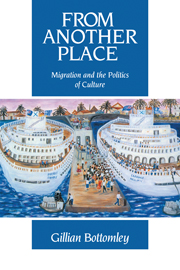Book contents
- Frontmatter
- Contents
- Preface and acknowledgements
- Part I Migration studies and the problem of culture
- Chapter 1 Migrations and cultural analyses: a point of departure
- Chapter 2 Comparative studies of migration, ethnicity, ‘race’ and culture in the U.S.A. and Britain
- Chapter 3 Traditions, structures and culture as process
- Part II Practising cultures
- Part III Constructing identities: gender, class, and ethnos
- Bibliography
- Index
Chapter 2 - Comparative studies of migration, ethnicity, ‘race’ and culture in the U.S.A. and Britain
Published online by Cambridge University Press: 05 November 2011
- Frontmatter
- Contents
- Preface and acknowledgements
- Part I Migration studies and the problem of culture
- Chapter 1 Migrations and cultural analyses: a point of departure
- Chapter 2 Comparative studies of migration, ethnicity, ‘race’ and culture in the U.S.A. and Britain
- Chapter 3 Traditions, structures and culture as process
- Part II Practising cultures
- Part III Constructing identities: gender, class, and ethnos
- Bibliography
- Index
Summary
The history which bears and determines us has the form of a war rather than that of language: relations of power, not relations of meaning. History has no ‘meaning’, though this is not to say that it is absurd or incoherent. On the contrary, it is intelligible and should be susceptible to analysis down to the smallest detail, but this in accordance with the intelligibility of struggles, of strategies and tactics.
Foucault, quoted in Lipsitz, 1990, p.30Many of the examples and contextual studies used in this book come from Greece or Australia. As we will see, migration has been central to the histories and cultural formation of both countries. Chapters 1 and 3 sketch a comparative framework for these specific analyses, but I also want to relate them more closely to some of the migration studies undertaken in other milieux, partly in order to argue for the general heuristic value of the approach that I will develop. I described this approach as ‘comparative sociology’, but it can have implications for political economists, political scientists and educationists as well as for scholars and practitioners concerned with settlement programs and cultural production and with individual lives. The integration of structural, cultural and subjective dimensions throughout these chapters will require the crossing of disciplinary boundaries.
- Type
- Chapter
- Information
- From Another PlaceMigration and the Politics of Culture, pp. 16 - 35Publisher: Cambridge University PressPrint publication year: 1992



